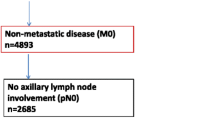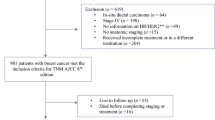Summary
One hundred seventy-five patients with metastatic breast cancer, treated with a combination chemotherapy (Cooper regimen), were analyzed retrospectively to identify the value of the traditional prognostic parameters (disease-free interval; menopausal status; dominant site of metastatic lesion) for the stratification of patients before randomization. Response rate and survival time were not significantly affected by the disease-free interval and menopausal status. A significant difference was detected among the three categories total extent of disease (according to Swenerton) was found to be the most important factor for predicting response and survival time after combination cytotoxic treatment. The differences between the dominant size of metastatic disease are mainly influenced by different size of metastatic spread. Therefore, there is found a significant correlation between the different types of dominant lesions and total extent of disease. In conclusion, the particular sites of metastatic spread seem to be of less importance than overall extent of disease in predicting the outcome. A critical evaluation of the three traditional stratification parameters and introduction of a semiquantitative estimation of total tumor burden as a new stratification parameter seems to be necessary when planning and comparing future trials.
Similar content being viewed by others
References
Ahman DLM, Bisel HF, Hahn RG (1975) Analysis of a multiple drug program in the treatment of patients with advanced cancer utilizing 5-fluorouracil, cyclophosphamide and prednisone with or without vincristine. Cancer 36:1925–1935
AMA, Council of Drugs. (1960) Androgens and estrogens in the treatment of disseminated mammary carcinoma. JAMA 12:1271–1283
Breslow N (1970) A generalized Kruskal Wallis test for comparing k samples subject to unequal patterns of censorship. Biometrika 57:579–594
Brunner KW, Martz GA (1976) Das Mammakarzinom. In: Brunner KW, Nagel GA (Hrsg) Internistische Krebstherapie. Springer, Berlin Heidelberg New York, S 250
Canellos GP, Pocock SJ, Taylor SG (1976) Combination chemotherapy for metastatic breast carcinoma; prospective comparison of multiple drug therapy with phenylalanine mustard. Cancer 38:1882–1893
Carbone PP (1977) Tumor biology and clinical trials: The Richard and Hinda Rosenthal Foundation award lecture. Cancer Res 37:4239–4255
Carter SK (1972) Single and combination non hormonal chemotherapy in breast cancer. Cancer 30:1543–1549
Cooper RG (1969) Combination chemotherapy in hormone resistant breast cancer. Proc Am Assoc Cancer Res 10:58–65
Cooperative Breast Cancer Group (1964) Testosterone propionate therapy in breast cancer. JAMA 188:1069–1076
Cutler SJ, Asire AJ, Taylor SG (1969) Classification of patients with disseminated cancer of the breast. Cancer 24:861–872
Escher GC, Kaufmann RJ (1963) Advanced breast carcinoma factors influencing survival. Acta UICC 19:1039–1044
Fey M (1978) Prognostische Faktoren beim metastasierenden Mammakarzinom. Inaugural-Diss., Univ. Bern
Fracchia AA, Randall HJ, Farrow JH (1971) The result of adrenalectomy in advanced carcinoma of the breast. Surg Gynecol Obstet 133:241–247
George SL, Hoogstraten B (1977) Prognostic factors in the initial response to therapy by patients with advanced breast cancer. J Natl Cancer Inst 60:731–735
Ingle J, Tormey DC, Bull JM (1975) Bone marrow involvement in breast cancer: Diagnosis and response to therapy. Proc Am Assoc Cancer Res 16:245–249
Kaplan EL, Meier P (1958) Nonparametric estimation from incomplete observations. J Am Statist Assoc 53:457–481
Mantel N (1966) Evaluation of survival data and two new rank order statistics arising in its consideration. Cancer Chemother Rep 50:163–170
Obrecht JP, Hartmann P, Della-Pietra C (1976) Die Chemotherapie des Mammakarzinoms. Ther Umsch 33:808–813
Rozencweig M, Heuson J (1975) Breast cancer: Prognostic factors and clinical evaluation. In: Staquet M (ed) Cancer therapy: Prognostic factors and criteria of response. Raven Press, New York, p 139
Russel J, Baker JW, Dady PC, Ford T (1977) Response of metastatic breast cancer to combination chemotherapy according to site. Br Med J 2:1390–1392
Schemper M (1981) Statistische Analyse der Lebensdauer: Verteilungsfreie Testatistiken für qualitive und quantitative unabhängige Variable. Seminars of ROES of the Int Biometric Soc, Bad Ischl
Scherg H (1976) Quantal response regression: Ein Verfahren zur statistischen Analyse einer multifaktoriellen Genese. Meth Inf Med 1:15–25
Swenerton KD, Legha SS, Smith T, Hortobaggi GN, Gehan EA, Yap HY, Gutterman JU, Blumenschein GR (1979) Prognostic factors in metastatic breast cancer treated with combination chemotherapy. Cancer Res 39:1552–1560
Taylor SG (1962) Endocrine ablation in disseminated mammary carcinoma Surg Gynecol Obstet 115:443–451
Valagussa P, Brambilla C, Bonnadonna G (1979) Advanced breast cancer: Are the traditional stratification parameters still of value when patients are treated with combination chemotherapy? Eur J Cancer 15:565–572
Young RC (1977) Combination chemotherapy in advanced breast cancer. Ann Intern Med 86:789–795
Author information
Authors and Affiliations
Rights and permissions
About this article
Cite this article
Mörz, R., Francesconi, M., Schemper, M. et al. The value of prognostic parameters for the stratification of advanced breast cancer patients. J Cancer Res Clin Oncol 102, 289–299 (1982). https://doi.org/10.1007/BF00411349
Received:
Accepted:
Issue Date:
DOI: https://doi.org/10.1007/BF00411349




